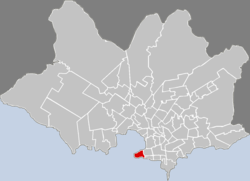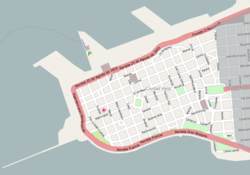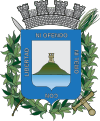Timeline of Montevideo
The following is a timeline of the history of the city of Montevideo, Uruguay.
18th century
Part of a series on the |
|---|
| History of Uruguay |
 |
|
Early History
|
|
Independent State |
|
20th Century
|
|
Military Regime
|
|
Modern Uruguay
|
|
|
- 1726 – Settlement established by Spaniard Bruno Mauricio de Zabala.
- 1778 – Free port status acquired.[1]
- 1797 – 31 August: British ship Lady Shore arrives in harbour.
19th century
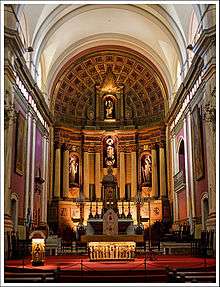
Montevideo Metropolitan Cathedral was conseceated in 1804
- 1804 – Montevideo Metropolitan Cathedral consecrated.[2]
- 1807
- 3 February: City besieged by British forces; British take city.
- Printing press in operation.
- Southern Star newspaper in publication.[3]
- September: British occupation ends.
- 1811 – Siege of Montevideo by forces of the United Provinces of the River Plate.
- 1812
- Montevideo Cabildo built.
- Siege of Montevideo (1812-1814) begins.
- 1814 – Siege ends; Spanish loyalists surrender.
- 1817 – 20 January: city occupied by Luso-Brazilian forces.
- 1821 – City becomes part of Brazilian province Cisplatina.
- 1823 – Siege of Montevideo (1823)
- 1825 – Hospital de Caridad founded.[2]
- 1828
- City becomes capital of independent Oriental Republic of Uruguay.[1]
- British Cemetery established.
- 1829 – City wall dismantled.
- 1830 – National museum founded.[1]
- 1833 – Public library founded.[1]
- 1843 – Great Siege of Montevideo begins.[1]
- 1847 – Anglican church built.[1]
- 1849 – University of the Republic founded.
- 1851 – Great Siege of Montevideo ends.
- 1856
- Solís Theatre built.[4]
- Salesas convent founded.[2]
- Epidemic.[2]
- 1857 – British hospital founded.[1]
- 1858 – Church of the Immaculate Conception built.[2]
- 1862 – Hotel Oriental built.[2]
- 1863 – Bolsa (exchange) built.[2]
- 1866 – Post office built.[2]
- 1868 – Mercado del Puerto built.
- 1871 – Teatro Cibils inaugurated.[4]
- 1874 – Estévez Palace built.
- 1876 – Punta Brava Lighthouse erected.
- 1879 – Population: 91,167.[5]
- 1880 – Nuevo Teatro San Felipe opens.[4]
- 1885 – Escuela Brasil (school) established.
- 1889 – Teatro Nuevo Politeama inaugurated.[4]
- 1895 – Teatro Stella d'Italia founded.[4]
- 1900 – Estadio Gran Parque Central opens.
20th century
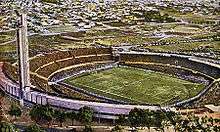
The Estadio Centenario opened for the 1930 FIFA World Cup
- 1905 – Teatro Urquiza inaugurated.[6]
- 1906 – Electric streetcar begins operating.[7]
- 1908
- Municipality of Montevideo created.
- Daniel Muñoz becomes Intendant of Montevideo.
- Immigrants' Hotel opens.[6]
- 1909 – Urbano hotel in business.[6]
- 1910 – Teatro 18 de Julio opens.[4]
- 1911
- National Museum of Visual Arts (Uruguay) inaugurated.
- May: General strike.[8]
- 1913 – Villa del Cerro and La Teja become part of city.
- 1925 – Palacio Legislativo (Uruguay) built.
- 1930
- Estadio Centenario opens.
- July: 1930 FIFA World Cup held.[9]
- Juan Manuel Blanes Museum established.
- 1933 – International Conference of American States held; Montevideo Convention on the Rights and Duties of States signed.
- 1935 – Asociación de Arte Constructivo founded.[10]
- 1941 – Palacio Municipal (Montevideo) built.
- 1945 – Cine Trocadero opens (approximate date).[11]
- 1947 – Airport terminal inaugurated.
- 1952 – Cinemateca Uruguaya (film archive) founded.[12]
- 1953 – Museo Torres García opens.[13]
- 1956 – Cilindro Municipal (arena) opens.
- 1958 – Museum and Municipal Archives inaugurated in the Cabildo.[14]
- 1963 – Population: 1,154,465.[15]
- 1964 – Edificio Panamericano (residential building) constructed.
- 1973 – 27 June: 1973 Uruguayan coup d'état.
- 1975 – Population: 1,229,748.[16]
- 1983 – September: Labor demonstration.[17]
- 1985 – Liberty Building (Montevideo) built.
- 1988 – May: Pope John Paul II visits city.
- 1990
- Tabaré Vázquez elected mayor.[18]
- City administration partially decentralized.
- 1991 – Population: 1,360,258.[19]
- 1992 – Sarandi street pedestrianized.
- 1995 – 23 July: 1995 Copa América Final football tournament held.
21st century
.jpg)
Executive Tower, Montevideo
- 2007 – Mercosur headquartered in city.[20]
- 2008 – Executive Tower, Montevideo built.
- 2009 – Carrasco International Airport expands.
- 2010 – Ana Olivera becomes Intendant of Montevideo.
- 2011 – Population: 1,319,108.
- 2015 – Daniel Martínez becomes Intendant of Montevideo.
- 2016 – Population: 1,380,432.[21]
- 2019 – Christian Di Candia becomes Intendant of Montevideo.
gollark: --choice test1 test2
gollark: --choice test1 test2
gollark: --choice test1 test2
gollark: --choice test1 test2
gollark: Okay, let's try THIS now.
See also
- Montevideo history
- History of Montevideo
- Barrios of Montevideo
- List of Municipal Intendants of Montevideo
- List of Governors of Montevideo, 1751-1817
- List of museums in Montevideo
References
- Britannica 1910.
- Mulhall 1885.
- "Montevideo (Uruguay) Newspapers". WorldCat. US: Online Computer Library Center. Retrieved 14 July 2013.
- Salgado 2003.
- Stanford 1883.
- Peck 1916.
- Rosenthal 1995.
- Rosenthal 1995b.
- Tom Dunmore (2011). Historical Dictionary of Soccer. Scarecrow Press. ISBN 978-0-8108-7188-5.
- "South America, 1900 A.D.–present: Key Events". Heilbrunn Timeline of Art History. New York: Metropolitan Museum of Art. Retrieved 30 November 2014.
- "Movie Theaters in Montevideo, Uruguay", CinemaTreasures.org, Los Angeles: Cinema Treasures LLC, retrieved 14 July 2013
- "Institucional" (in Spanish). Cinemateca Uruguaya. Retrieved 14 July 2013.
- "Historia del Museo Torres García". Montevideo: Museo Torres García. Archived from the original on 14 May 2014. Retrieved 14 July 2013.
- "Historia" (in Spanish). Montevideo: Museuo y Archivo Cabildo. Retrieved 14 July 2013.
- "Population of capital cities and cities of 100,000 and more inhabitants". Demographic Yearbook 1965. New York: Statistical Office of the United Nations. 1966.
- United Nations Department of Economic and Social Affairs, Statistical Office (1976). "Population of capital city and cities of 100,000 and more inhabitants". Demographic Yearbook 1975. New York. pp. 253–279.
- Robert J. Alexander (2005), A history of organized labor in Uruguay and Paraguay, Westport, Connecticut: Praeger, ISBN 0275977455
- Canel 2001.
- United Nations Department for Economic and Social Information and Policy Analysis, Statistics Division (1997). "Population of capital cities and cities of 100,000 and more inhabitants". 1995 Demographic Yearbook. New York. pp. 262–321.
- "Uruguay Profile: Timeline". BBC News. Retrieved 13 July 2013.
- "Population of capital cities and cities of 100,000 or more inhabitants". Demographic Yearbook 2016. United Nations Statistics Division. 2017.
This article incorporates information from the Spanish Wikipedia.
Bibliography
- Published in the 19th century
- Emeric Essex Vidal (1820), Picturesque Illustrations of Buenos Ayres and Monte Video, London: R. Ackermann, OCLC 6287966, OL 6939031M
- Jedidiah Morse; Richard C. Morse (1823), "Monte Video, Buenos Ayres", A New Universal Gazetteer (4th ed.), New Haven: S. Converse
- David Brewster, ed. (1830). "Monte Video". Edinburgh Encyclopædia. Edinburgh: William Blackwood.
- John Hale Murray (1871), "(Monte Video)", Travels in Uruguay, London: Longmans & Co., OCLC 257407035
- "The Capital", The Republic of Uruguay, South America, London: E. Stanford, 1883, OCLC 9173138
- Michael George Mulhall; Edward T. Mulhall (1885), "Montevideo", Handbook of the River Plate, comprising the Argentine Republic, Uruguay and Paraguay (5th ed.), Buenos Aires: M.G. and E.T. Mulhall
- Theodore Child (May 1891). "Republic of Uruguay". Harper's New Monthly Magazine. US. 82: 917+.. Includes description of Montevideo.
- Archibald Wilberforce, ed. (1893). "Montevideo". Capitals of the Globe. New York: Peter Fenelon Collier. hdl:2027/mdp.39015061863513.
- Orestes Araújo (1900), "Montevideo", Diccionario geografico del Uruguay (in Spanish), Montevideo: Imprente Artística, de Dornaleche y Reyes, OCLC 1446163
- Published in the 20th century
- "San Felipe y Santiago de Montevideo", Encyclopaedia Britannica (11th ed.), New York, 1910, OCLC 14782424 – via Internet Archive
- Charles Warren Currier (1911), "Montevideo", Lands of the Southern Cross: a Visit to South America, Washington, DC: Spanish-American Publication Society
- W.H. Koebel (1911), "Montevideo", Uruguay, London: Unwin
- United States Bureau of Foreign and Domestic Commerce (1914), "Montevideo", Trade Directory of South America for the Promotion of American Export Trade, Washington, DC: Government Printing Office, OCLC 5821807
- Alberto B. Martínez (1914), "Montevideo", Baedeker of the Argentine Republic; including also parts of Brazil, the Republic of Uruguay, Chili and Bolivia, Barcelona: R. Sopena, printer
- Henry Stephens (1915), "Montevideo", South American Travels, New York: Knickerbocker Press, OCLC 6588111
- Annie Smith Peck (1916), "Montevideo", The South American Tour, New York: G.H. Doran, OCLC 4541554
- Gordon Ross (1917), "Mondevideo and Buenos Aires", Argentina and Uruguay, London: Methuen
- Guide book: Montevideo, Uruguay, U.S. Navy Ports of the World, Lansing, MI: Robert Smith Company, 1921, OL 25166657M
- Ernst B. Filsinger (1922), "Montevideo", Commercial Travelers' Guide to Latin America, Washington, DC: Govt. Print. Office
- Albes, Edward (1922). Montevideo, the city of roses. Pan American Union online; 29 pp well-illustrated
- Anton Rosenthal (1995a). "The Arrival of the Electric Streetcar and the Conflict over Progress in Early Twentieth-Century Montevideo". Journal of Latin American Studies. 27.
- Anton Rosenthal (1995b). "Streetcar Workers and the Transformation of Montevideo: The General Strike of May 1911". The Americas. 51.
- Published in the 21st century
- Eduardo Canel (2001). "Municipal Decentralization and Participatory Democracy: Building a New Mode of Urban Politics in Montevideo City?". European Review of Latin American and Caribbean Studies (71).
- Susana Salgado (2003). The Teatro Solis: 150 Years of Opera, Concert and Ballet in Montevideo. Wesleyan University Press. ISBN 9780819565945.
- David Marley (2005), "Montevideo", Historic Cities of the Americas, Santa Barbara, CA: ABC-CLIO, p. 817+, ISBN 1576070271
This article is issued from Wikipedia. The text is licensed under Creative Commons - Attribution - Sharealike. Additional terms may apply for the media files.
